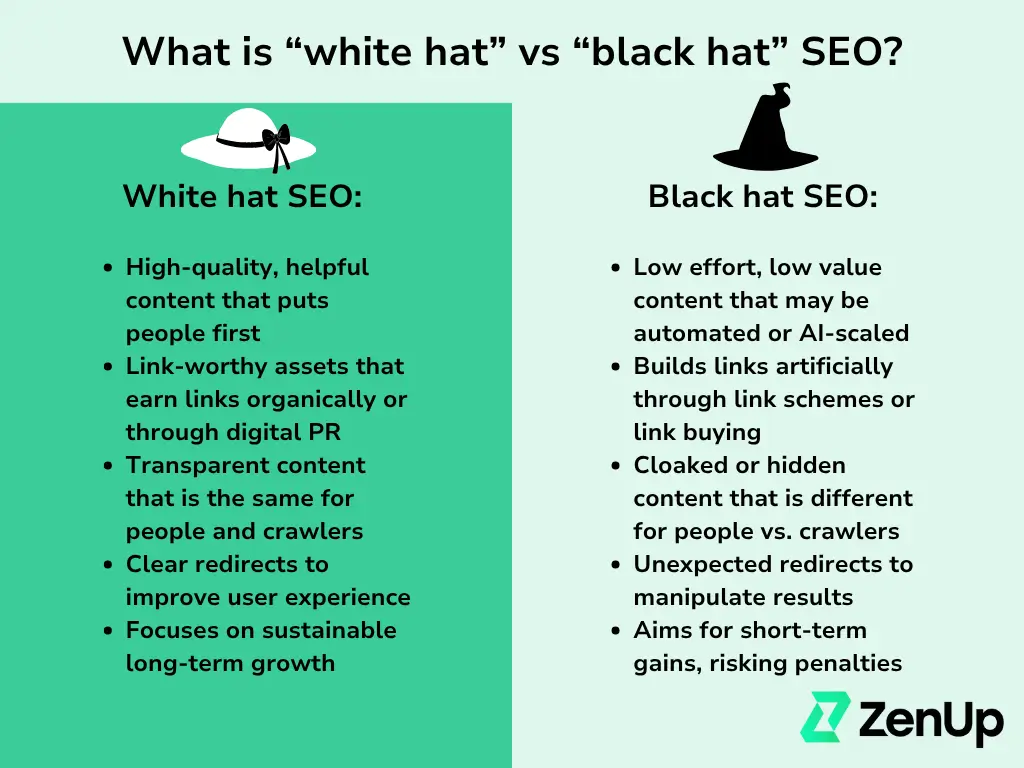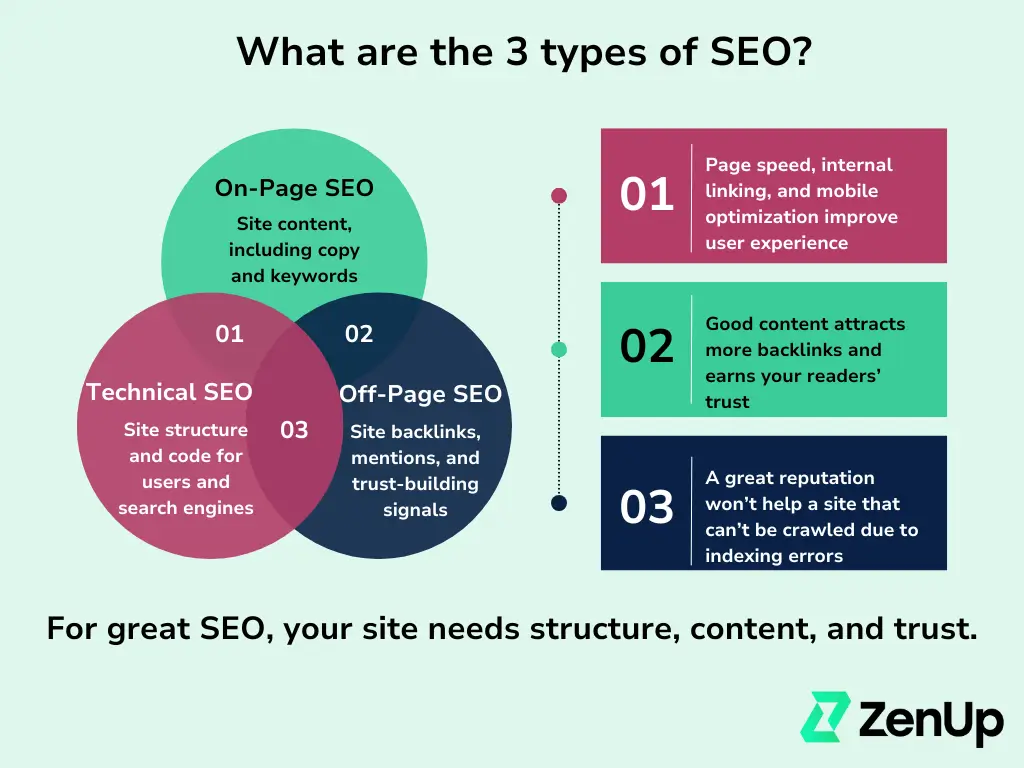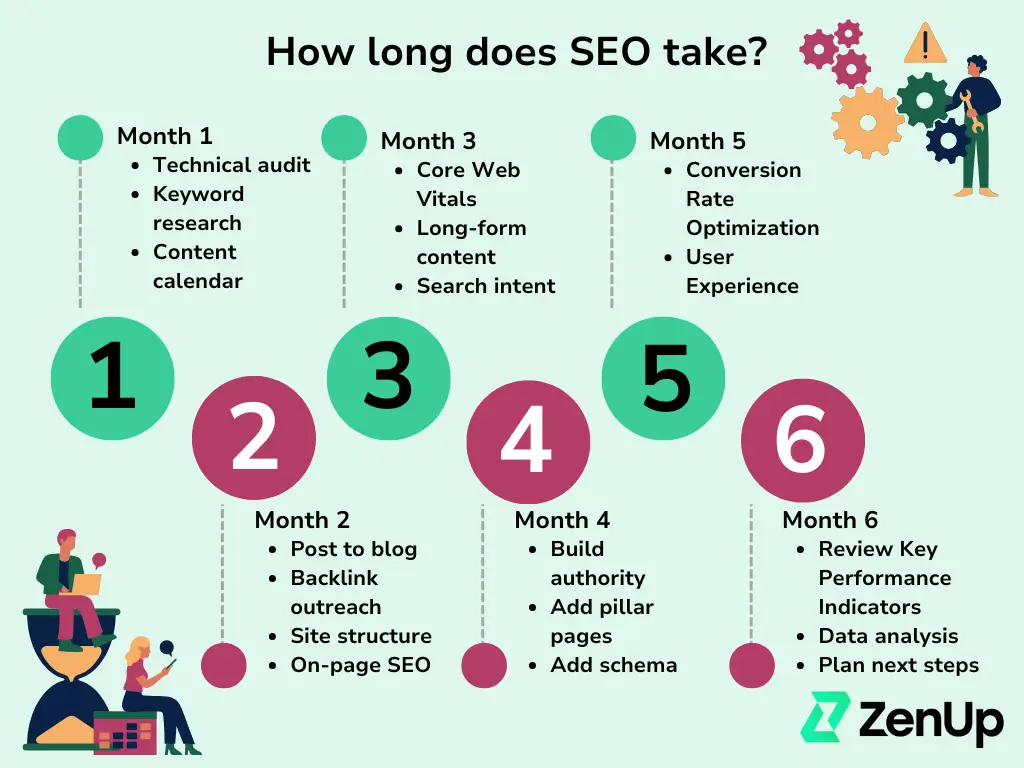What is Ethical SEO and How Does it Help Small Businesses?
Need help with marketing? Get a free marketing plan from top experts
Get a free marketing plan
By Marsha Hebert, Founder of Always Typing
Last Updated: June 16, 2025


By Marsha Hebert, Founder of Always Typing
Last Updated: June 16, 2025





As a responsible business owner, you know you have to hit certain search engine optimization rankings to appear near the top of search engines like Google. However, you should never chase rankings at the cost of your values. That’s where ethical SEO practices become important.
Ethical SEO prioritizes people over algorithms to help your brand earn trust through transparency, quality content, and a strong user experience. It’s time to ditch shortcuts and embrace ethical SEO techniques that bring search engine rules and user intent into harmony.
Key takeaways:
SEO ethics is, first and foremost, rooted in transparency, integrity, and a focus on people. When you respect search engine guidelines and avoid shortcuts that deceive search engines, you come closer and closer to white hat SEO.
White hat SEO is the pinnacle of digital marketing success, the crème de la crème, and the gold standard. It’s an above-board approach that keeps you on the search engines’ good side and brings traffic that sticks around. It’s a rule-abiding, long-term approach focused on delivering value to real people.

White hat and ethical SEO practices don’t just protect your site, they help you build a sustainable online presence that earns trust and stands the test of time. To get to this point, you must do the following:
Just like ethical SEO and white hat strategies are two sides of the same coin, unethical SEO practices go hand in hand with what’s commonly known as black hat SEO. While it’s tempting to celebrate quick wins these tactics can deliver, black hat practices can seriously backfire on you. Google may demote or remove your site from their search engine if you violate search engine guidelines. This hurts your visibility, credibility, and long-term growth — it’s just not worth it.
Be wary of any SEO agency offering guaranteed or quick results, especially for a lower than usual SEO cost. They’re likely planning to engage in one or more of these shady practices:
Artificial intelligence is a great productivity tool, but as a responsible business owner engaged in ethical SEO practices, you don’t want to rely on them to generate content at scale. Human oversight is a must for protecting your reputation, especially given that AI tools like ChatGPT tell you up front that it can make mistakes and advises you to check important information.
On top of that, Google has made it clear that content automation and scaled content abuse are both violations of their spam policies. When you publish unedited, low-value AI content, it may be flagged as manipulative or spammy. Remember, your goal isn’t to chase rankings, it’s to build trust with your target audience and create connections that generate trusting relationships.
Of course, none of this is to say that AI can’t be your friend.
The bottom line is that AI should support your voice, not replace it. The end result needs to reflect real value and real intent. Use it to support your SEO efforts:
No matter which type of SEO you’re working on, the goal is always the same: long-term, ethical growth. Enter: sustainability, content quality, and originality.
Search engines reward content that’s genuinely helpful. That means creating content that serves both users and search engines. What does “high-quality content” mean? It’s content that’s easy to navigate, rich in value, and optimized with intent.
Ethical on-page SEO goes beyond keywords. At ZenUp, we recommend (and use) strategies that put users first: clear formatting, trustworthy advice, and information that stays accurate and up to date. We also prioritize internal linking, accessible design, and strong page structure to keep visitors engaged.
To do it right:
Want to learn more about how content supports SEO? Check out our guide on content marketing and SEO.
Ethical SEO focuses on more than just what you do. It’s also about how you monitor progress and adapt to stay in compliance. Tracking performance metrics and staying current with major search engine rules will help you make ethical marketing decisions that keep your site competitive and penalty free.
If you’re not measuring your SEO efforts, you’re just guessing. Tools like Google Search Console, GA4, and PageSpeed Insights are crucial for any successful SEO strategy. They allow you to check your website’s rankings, monitor how well your content performs over time, and see how well it aligns with search engine algorithms.
Use these tools to gather data that guides you to identifying areas for improvement and boost user experience:
Search engine algorithms evolve constantly. What worked last year (or even last month) probably won’t cut it today. Ethical SEO practitioners don’t just follow best practices, they keep up with them. Think of it like continuing education.
There are certain routines and habits you should build into your ethical practices. Obviously, you’ll want to know what Google expects from your website if you want to earn (and keep) organic traffic from search engine results pages. Google Search Central, Moz, Semrush, and Search Engine Journal are great resources for keeping up with search engine guidelines. They can help you understand what’s noise and what’s a real signal that calls for action.
Frequent web page and site audits are important parts of ethical SEO practices, too. You have to make sure you’re not missing optimization opportunities or hosting low-value content. Yes, the goal is to stay aligned with best practices, but you’re also staying ahead of penalties and potentially avoiding legal consequences — like copyright infringement, breach of contract, and false advertising claims.
The first step to improving your ethical SEO game is to understand the different types. At the core, there are three: on-page, off-page, and technical. These form the foundation of most search optimization strategies.

This is where a strong ethical SEO starts and it’s exactly what you think it is. It has everything to do with what you do on your site to improve rankings, including optimizing web pages with relevant keywords, metadata, internal linking, headers, and high-quality content. Your goal with ethical on-page SEO should be to create pages that make sense to both search engines and real people.
This means you’re not just posting content to appease the algorithm gods, you’re setting your business up as an industry expert by helping visitors find what they actually need. Ethical SEO practices in this case includes aligning content with specific search queries, using descriptive and keyword-friendly URLS and alt text, organizing content with clear headings, using appropriate internal links, and avoiding keyword stuffing or manipulative formatting (like invisible text).
Off-page SEO is all about how the rest of the web sees your business. It includes strategies like digital PR, guest posting, and ethical link building in support of brand mentions and trust-building signals — the very things search engines use to assess your site’s credibility. Done ethically, off-page SEO doesn’t just boost rankings, it builds a positive online reputation that lasts.
But what does “done ethically” mean when it comes to off-page SEO?
Ethical off-page SEO practices mean you’re working to earn visibility. You’re not buying it. That means collaborating with reputable publications, sharing helpful content people actually want to read, and avoiding shady tactics like link farms, comment spam, or private blog networks (PBNs).
When you set the infrastructure of your site up properly, search engines can crawl it, index it, and understand it without any friction. Visitors can’t see this backend stuff, but it’s super important and has a huge impact on how well your content performs.
Good technical practices focus on making your site fast, secure, and accessible. While there is a lot that goes it, there’s also a checklist you can use that’s been fairly unchanged for years:
Technical search engine optimization is one place you really can’t cut corners. Getting this part right builds a solid foundation that supports a better experience for users and search engines. That’s what helps you earn better rankings.
You don’t have to outsmart search engines in an attempt to sway metrics in your favor. Work in harmony with your audience and use ethical SEO to stand out from the competition. Chasing trends and gaming the system won’t help you build trust. Keep showing up and stay focused on the long game because the best brands aren’t always the loudest.
One of ZenUp’s superpowers is offering clarity on what ethical SEO looks like for different businesses. Get a free marketing plan tailored to your goals and built on strategy.
Ethical SEO follows search engine optimization guidelines to put users first. Whereas, unethical practices try to manipulate rankings through shortcuts like keyword stuffing, hidden text, or paid links that often lead to penalties or loss of visibility.
White hat SEO is a digital marketing approach that aims to attract website visitors with a focus on long-term strategies aligned with search engine guidelines. The main objective is to build value through great content to improve user experience and earn trust. On the other hand, black hat SEO relies on wily tactics to earn quick wins, often at the expense of credibility and growth.
Of course, your growth timeline depends on a lot of factors, including your industry, niche, and competition. However, you should start seeing improvements in organic traffic and website performance within three to six months. You have to be consistent and work at it regularly, keeping in mind that great SEO isn’t a one-and-done type of thing.

